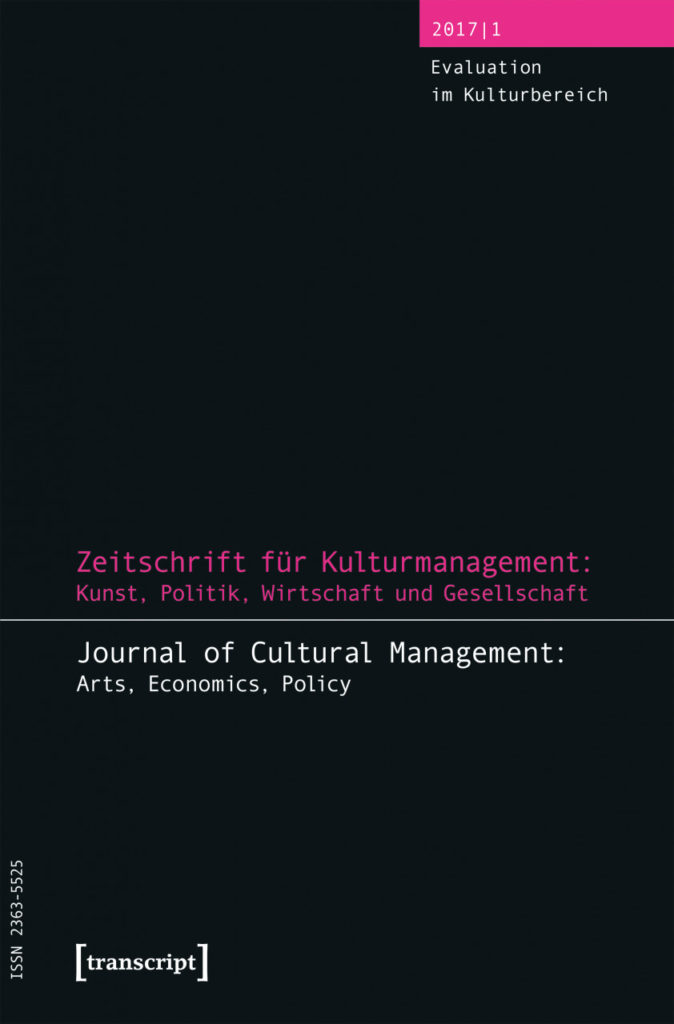Research Article
Evaluation im kulturpolitischen Wirkungsbereich
Grundprobleme und Herausforderungen
Abstract
Since the rise of New Public Management, regular evaluations have been employed as a cultural policy guidance instrument. However, the credibility of the associated implicit promise of objective, evidence-based decision-making processes starts to crack as soon as one gains an insight into how evaluation studies are created and manipulatively applied. How should one respond to the claim of the epistemological validity of evaluation studies’ results? And what should one pay attention to in order to ensure the quality of evaluation studies? It is not sufficient to simply fulfil formal academic criteria (methodology and systematics of data collection and evaluation), or to demand clarity (well-founded selection of indicators, well-founded conclusions), and transparency (disclosure of the evaluation procedure and the underlying motives). Consequently this article is focused on how to approach fundamental problems, ambivalences and imponderables that arise in the course of any evaluation study. The aim is to achieve greater reflexivity in the inherent ambiguity and fragility of evaluation processes.
Keywords
2017 (1)
Evaluation im Kulturbereich

Related Articles
Journal of Cultural Management and Cultural Policy
Essay
Missing the Audience
Online Musicking in Times of COVID-19Journal of Cutural Management and Cultural Policy
Case Study
The intangible side of tangible objects: Marimba making from Bagamoyo to Germany
Journal of Cultural Management and Cultural Policy
Essay
Political Re-formulations in Inclusive Theatre
Journal of Cultural Management 2019 (2)
Essay
‘Southern’ perspectives about cultural management: some thoughts
Journal of Cultural Management 2019 (1)
Essay
Journal of Cultural Management and Cultural Policy
Essay
© 2026, Journal of Cultural Management and Cultural Policy
Keywords
- Aesthetics
- Higher Education
- Cultural Diplomacy and Foreign Cultural Policy
- Occupation
- Career and Professional Role
- Audience Development
- Audience Studies and Visitor Studies
- Visitor Motivations
- Business
- Covid Pandemic
- Democracy
- Digitalization
- Diversity
- Third Sector
- Empirical Aesthetics
- Development
- Ethics
- Evaluation
- Field Theory
- Festival
- Film
- Federalism
- Community Arts
- Societal Change
- Ideology
- Staging
- Career
- Communication
- Concert
- Creative Industries
- Creativity
- Crisis
- Culture
- arts organizations, cultural organizations
- Cultural Participation
- Cultural Change
- Fincancing The Arts
- Cultural Promotion Law
- Cultural History
- Cultural Management
- Cultural Economy
- Cultural Organizations
- Art Education
- Cultural Policy
- Cultural Production
- Cultural Sociology
- Art Education
- Cultural Understanding
- Arts Administration
- Cultural Industry
- Cultural Sciences
- Art
- Art Field
- Arts Research
- Artists
- Artistic Research
- Artistic Reputation
- Arts Management
- Arts Organizations
- Art education
- Arts Marketing
- Arts Administration
- Curating
- Leadership
- Literature
- Advocacy
- Management
- Marketing
- Market
- Media
- Methods Development
- Mexico
- Monumentalizing
- Museum
- Music
- Non-Visitor Studies
- Opera
- Orchestra
- Organization
- Political Expression
- Post-truth Politics
- Professional Role
- Audience
- Audience Development
- Law
- Government
- Role
- Socially Engaged Art
- Social Cohesion
- Social Change
- Social Cohesion
- Non-visitor Socio-demographics
- Socioculture
- State
- Symbolic capital
- Dance
- Participatory Justice
- Theatre
- Theatre Governance
- Theory Development
- Tourism
- Transformation
- Survey
- Entrepreneurship
- Urbanism
- Civil Society


